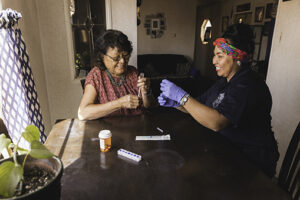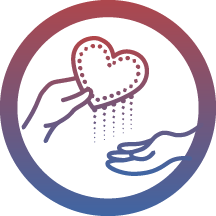Did you feel your care provider treated you with respect?
Why is this indicator important to First Nations, Inuit and Métis?
A barrier to improving health outcomes amongst Indigenous Peoples is the profound distrust that many have regarding the healthcare system.

This distrust deepens in the face of ongoing discrimination and racism in health settings, causing many to avoid seeking healthcare services.
When coupled with care providers’ lack of understanding of Indigenous Peoples, their history, culture and ways of knowing, the result is culturally unsafe spaces and care.
Respect is at the heart of culturally safe care. When Indigenous Peoples feel respected and safe in expressing their cultural identity, their interactions with the healthcare system and consequently, their cancer care outcomes are much better.
View Indigenous determinants of health
How does this affect care and outcomes?
 First Nations, Inuit and Métis are less likely to seek help when experiencing symptoms and more likely to delay seeking help for fear of poor care experiences, racism and discrimination in hospitals and the healthcare system.
First Nations, Inuit and Métis are less likely to seek help when experiencing symptoms and more likely to delay seeking help for fear of poor care experiences, racism and discrimination in hospitals and the healthcare system.
When they delay seeking help, First Nations, Inuit and Métis may receive a cancer diagnosis much later when treatment is more difficult or no longer possible and poor health outcomes are more likely.
Culturally safe, respectful care contributes to better communications, improved understanding, and empowered patients who are active contributors in a patient-centred care approach to their wellness journey.
Towards health equity
 Eliminating health inequities requires addressing the determinants of health, including racism and culturally unsafe care, in the health care system.
Eliminating health inequities requires addressing the determinants of health, including racism and culturally unsafe care, in the health care system.
There is growing recognition of the importance of cultural safety at both the individual care provider and organizational levels to achieve equitable health care.
Cultural safety is an outcome based on respectful engagement which better supports patients on their path to well-being during the cancer care journey and results in an environment where people feel safe when receiving care.
What this would mean for people in Canada
Respectful relationships between the healthcare system and Indigenous partners result in culturally safe cancer care which is responsive to the unique needs of Indigenous Peoples.
Racism in all its forms is recognized and disrupted in the cancer care system.
Everyone is treated with dignity and respect and receives care that is free from discrimination.
View indicator development process
View ways of measuring the indicators

